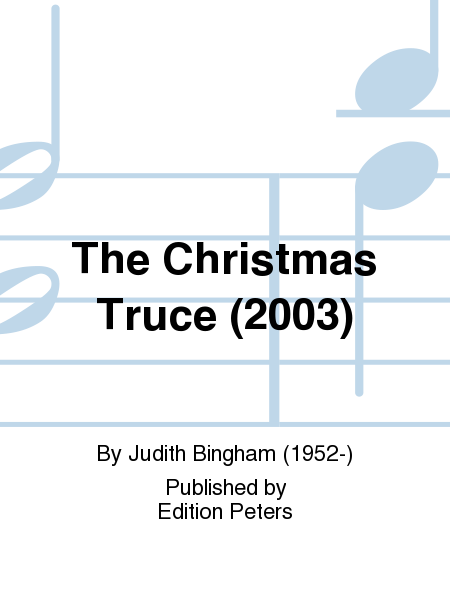The Christmas Truce
2003
Details
- Instruments
- Formats
- Usages
Description
SKU: PE.EP71191A
2003. Composed by Judith Bingham. Christmas Music. Modern. Full Score. Duration 00:25:00. Edition Peters #EP71191A. Published by Edition Peters (PE.EP71191A).Winner of the 2004 British Academy Award for Choral Music
Commissioned by BBC Radio 3 and first performed December 11th, 2003 by Robert Quinney (organ); the BBC Singers, and the Britten Sinfonietta, conductor Nicholas Cleobury; Saint Andrew's Hall, Norwich
Text: eyewitness and newspaper accounts selected, adapted, and poeticised by the composer. 2nd edition (incorporates a number of small changes and revisions made after the premiere
"Dedicated to my grandfathers, Vivian Thomas MacGowan and Bruce Percy Bingham, who were there." - Judith Bingham
"An R.A.F. flying officer, R.J. Fairhead, observed after the Second World War that if the soldiers along the Western Front in 1914 had refused to go back to fighting after the Christmas Truce, there would have been no 'power-mad dictators' in Europe and WW2 with its loss of millions of lives would never have happened. God's Truce. as many called it at the time, seemed a pivotal moment of opportunity for the western world, and yet the rank and file soldier by and large went back to fighting afterwards with nary a backward glance. One man described it as nothing more than an inteval in a boxing match, and indeed many of the extraordinary events that took place still seem based on competition and conflict - football matches (the Germans winning, generally), chasing rabbits and hares, swapping food and souvenirs, and the alternate singing of carols and folk songs.
And yet it is hard to get away from an overwhelming feeling of wonder and compassion when reading about the Truce. The Christmas setting is part of it - the fact that the Incarnation itself took place in a hostile and dangerous setting somehow imbues the Truce with a sense of the miraculous, of God intervening. The terrifying contrast, too, between the sentimental songs sung by both sides; in particular O Tannenbaum and Silent Night, and the unbelievable level of brutality and dehumanizing violence evokes in us, as human beings, pity for those young men who so easily sacrificed themselves, and regret for the endless chain oif conflict that defines our world.
The piece falls loosely into three sections, following the chain of events. At the opening, it is Advent and the men in their separate trenches sing two Advent hymns - a verse from the German chorale O Jesu Christ, du Hochstes Gut, and Stainer's hymn Come, thou long-expected Jesus. As if in answer to these prayers for help, it begins to snow. (It was the freezing weather that winter that enabled the men to walk easily across No-man's Land to each other.) Now it is Christmas Eve, and each side sings its favorite carol, O Tannenbaum and Silent Night. The Truce over, the bombardment recommences. Afterwards, the Stainer reprises as if at an interment of the dead. Each of these sections is punctuated by commentaries from the women's voices, acting like a kind of detached Greek chorus. I wanted to avoid using war poetry with all its iconic overtones, and so I have 'poeticized' many eyewitness accounts from both sides, and two newspaper reports, from the The Daily Mail and The Manchester Guardian." -- Judith Bingham

 Share
Share